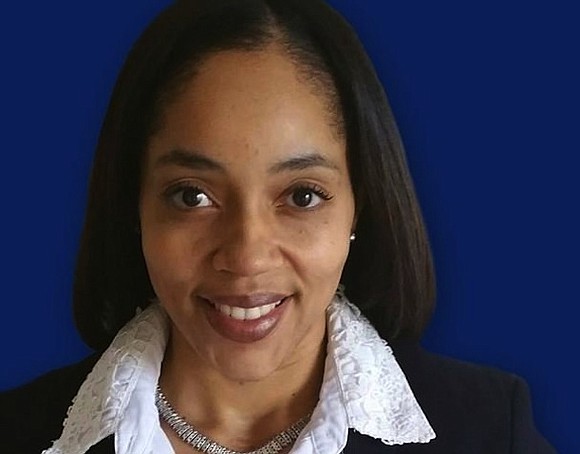Aramis Ayala: Prosecutor Takes Florida Governor to Court
CNN/Stylemagazine.com Newswire | 6/28/2017, 9:31 a.m.
CNN
(CNN) -- Just three months into her new position, prosecutor Aramis Ayala made a sweeping announcement.
She wouldn't seek the death penalty in a high-profile case of a suspected cop killer. Nor would she pursue the death penalty in other cases in the 9th Judicial Circuit which covers Orange and Osceola counties in central Florida.
The decision drew praise from anti-death penalty groups such as the state's ACLU, NAACP Legal Defense and Educational Fund and Amnesty International USA. It also angered people in law enforcement and particularly Florida Gov. Rick Scott.
Ayala was elected last November as state attorney for the 9th Judicial Circuit and started her new role in January, becoming Florida's first African-American state attorney.
But by March, the Democrat was butting heads with Florida's GOP governor over her controversial stance on the death penalty.
Ayala filed a lawsuit that is scheduled for oral arguments at Florida's Supreme Court on Wednesday.
Ayala v. Scott
It started in March when Ayala announced she wouldn't seek the death penalty in the high-profile case of Markeith Loyd, a suspect accused of killing his pregnant girlfriend and a female Orlando police officer, that triggered a massive manhunt.
She had said that the evidence showed the death penalty is overly expensive, slow, inhumane and does not increase public safety.
Frustrated with Ayala's position, the governor told her to recuse herself from the Loyd case. When she refused, he reassigned the case to another state attorney, who later filed notice seeking the death penalty.
"[Ayala] has made it clear that she will not fight for justice," Scott said in a statement in March. He also stripped her office of nearly two dozen first-degree murder cases.
Ayala in turn, challenged his decision to reassign 23 homicide cases to another prosecutor, in a lawsuit.
Ayala's lawsuit says that the governor "has no power to remove her for exercising her prosecutorial discretion."
Ayala argues that state law gives her "absolute" discretion in deciding whether and how to prosecute cases. Her lawsuit called Scott's reassignment "for political reasons" as "illegal, unfair, and disruptive." She wants the court to nullify Scott's orders and to redirect the cases the governor removed from her.
A joint response filed in April by Scott and Florida Attorney General Pam Bondi called Ayala's arguments "simply wrong" and defended the reassignments as legal.
They stated that Ayala's declaration to not seek the death penalty "does not involve a traditional exercise in prosecutorial discretion."
"Instead, it announces an across-the-board determination not to exercise discretion -- that is, a commitment not to undertake a case-specific analysis to determine whether any particular set of facts and circumstances calls for application of a legislatively-authorized punishment. Her decision ultimately reflects her personal beliefs rather than the law of this State."
The lawyer behind the controversy
Before Ayala became a public official locked in a court battle with the governor, she had worked in both the state attorney's office and in the public defender's office.
She had been an assistant state attorney in the homicide and major crimes unit in Orlando before deciding to run for state attorney last year. She ran on the slogan "Experience you can trust."
"The state attorney is one of the gatekeepers to our justice system," she had asserted during her campaign.
She upset her former boss, Jeff Ashton, in the primaries, who had gained fame in the Casey Anthony trial, and went on to win in November.
While running for office, she spoke about her husband's prior criminal history, saying his experiences had helped shape her views on the justice system, reported the Orlando Sentinel. Before the two met, David Ayala spent time in prison on drug conspiracy and counterfeiting charges, the paper reported, citing a statement on her website.
Her campaign website now redirects to the prosecutor's office site.
Ayala graduated from the University of Michigan and received her law degree at the University of Detroit-Mercy School of Law.
The case that led to a clash with Gov. Scott
The showdown between Scott and Ayala sparked over the prosecutor's handling of the Loyd case.
Loyd had been on the run since the December 13th shooting death of his ex-girlfriend, Sade Dixon, 24.
On January 9, Orlando police Lt. Debra Clayton received word that Loyd was near the Walmart and tried to confront him. She was shot and killed. There was another death when Orange County Sheriff's Deputy 1st Class Norman Lewis died in a crash while searching for Loyd on the day of Clayton's death.
Loyd was captured on January 17 and indicted about a month later.
Ayala said she decided to seek life without parole in Loyd's case after researching the law and the case. She said she also met with victims' families, reviewed files from other cases and spoke with other individuals involved in the criminal justice system, according to her lawsuit.
Her lawsuit states "she had not uniformly ruled out seeking the death penalty," but that the benefits of seeking a life sentence without parole would "outweigh the benefits of seeking the death penalty in virtually all cases."
Ayala said in March that the capital punishment in Florida had led to "chaos, uncertainty, and turmoil."
Capital punishment was recently in limbo in Florida for a brief period.
The US Supreme Court ruled in January 2016 that Florida's death penalty process was unconstitutional because it let judges have the final say, even when a jury's decision was not unanimous.




